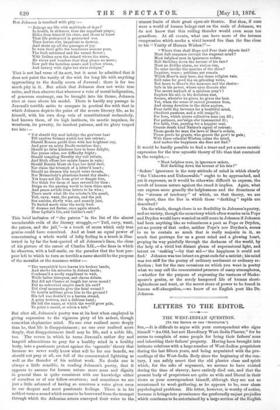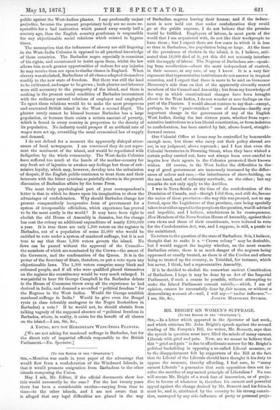LETTERS TO THE EDITOR.
THE WEST-INDIAN QUESTION.
[To THE EDITOR OF THE "SPECTATOR:]
Srit,—It is difficult to argue with your correspondent who signs himself "An Old, but not Hereditary West-India Planter," for he seems to complain of some people for being their fathers' sons and inheriting their fathers' property. Having been brought into intimate relations with a large number of West-Indian proprietors during the last fifteen years, and being acquainted with the pro- ceedings of the West-India Body since the beginning of the cen- tury, I can safely assert that the old planter class and spirit which, for the sake of argument, we assume to have existed during the time of slavery, have entirely died out, and that the present body of proprietors are quite as wide and liberal in their views as your correspondent himself, although they are not so accustomed to wool- gathering, as he appears to be, over sham psychological problems. His letter, however, is worthy of notice, because it brings into prominence the profoundly unjust prejudice which continues to be entertained by a large section of the English
public against the West-Indian planter. I say profoundly unjust prejudice, because the present proprietary body are no more re- sponsible for a bad institution which passed away nearly half a -century ago, than the English country gentleman is responsible for any objectionable social relations which existed in bygone times.
The assumption that the influences of slavery are still lingering in the West-India Colonies is opposed to all practical knowledge of those countries. The Barbados negro especially is conscious of his rights, and accustomed to insist upon them, whilst the law allows him much greater opportunities of redress for any injuries he may receive than are open to similar classes in England. When slavery was abolished, Barbadians of all classes adapted themselves seedily to the new state of freedom. But there was still the land to be cultivated, and sugar to be grown ; both planter and labourer were still necessary to the prosperity of the island, and there is nothing in the present social condition of Barbados inconsistent with the ordinary natural relations of employer and employed. To upset those relations would be to make the most prosperous and contented British island in the West a second Hayti. The planter surely cannot be blamed because Barbados has a large population, or because there exists a certain amount of poverty, which is found in every country in proportion to the density of its population. No industry could prosper if an artificial rate of wages were set up, overriding the usual economical law of supply and demand.
I do not defend for a moment the apparently disloyal utter- ances of local newspapers. I am convinced they do not repre- sent the sentiment of the island, and would be repudiated with indigation by the whole community. The West-India Colonies Cave suffered too much at the hands of the mother-country for any fresh act of injustice to awaken any feelings but those of sub- missive loyalty, which may, however, develop into the submission of despair, if the English public continues to treat them and their interests with the bitter cynicism so painfully shown in the present discussion of Barbadian affairs by the home Press.
The most truly psychological part of your correspondent's letter is that in which he draws upon his imagination to show the advantages of confederation. Why should Barbados change her present comparatively inexpensive form of government for a system of irresponsible officialism, which experience has proved to be the most costly in the world? It may have been right to abolish the old House of Assembly in Jamaica, but the change has cost the colony an additional expenditure of nearly £200,000 a year. It is true there are only 1,300 voters on the register in Barbados, out of a population of some 25,000 who would be entitled to vote under a system.of manhood suffrage, but it is not true to say that these 1,300 voters govern the island. No taws can be passed without the approval of the Council— the members of which are nominated by the Crown—the assent of the Governor, and the confirmation of the Queen. It is in the pow- er of the Secretary of State, therefore, to put a veto upon any objectionable laws. The 1,300 voters comprise many black and coloured people, and if all who were qualified placed themselves on the register the constituency would be very much enlarged. It WAS painful to hear Sir George Campbell in the Barbados debate in the House of Commons throw away all the experience he had derived in India, and demand a so-called "political freedom" for the Negroes in the West Indies. Would Sir George establish manhood suffrage in India? Would he give even the Bengal ryots (a class tolerably analogous to the Negro freeholders in Barbados) a vote ? If he would not, he should abstain from talking vaguely of the supposed absence of "political freedom in Barbados, where, in reality, it exists for the benefit of all classes on the island.—I am, Sir, &c., A YOUNG, BUT NOT HEREDITARY WEST-INDIA PLANTER.
,[We are not asking for manhood suffrage in Barbados, but for the direct rule of impartial officials responsible to the British Parliament —En. Spectator.]



































 Previous page
Previous page